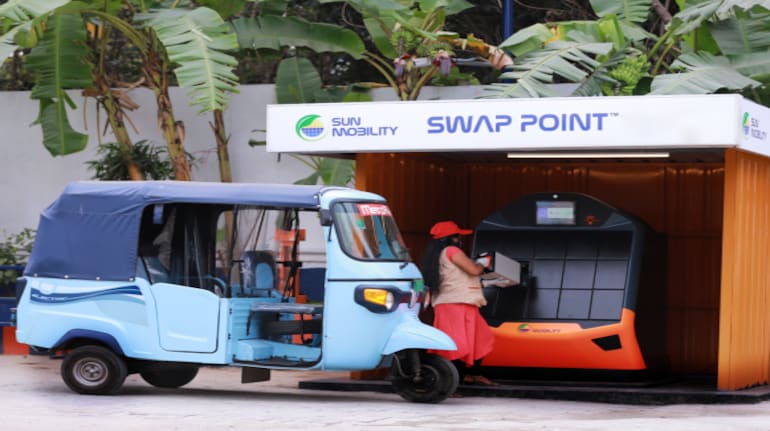



A homegrown battery–as-a-service (BaaS) player reached out to Nishant Shetty, an entrepreneur, in 2022 for running a swapping point as a franchisee in south west Delhi. With an initial outlay of Rs. 8.5 lakh, Shetty established Battery Safe, a swapping station which houses 50 electric vehicle (EV) batteries. The outfit now makes nearly Rs 1 lakh per month from the 150-175 electric two and three-wheelers it serves in its vicinity.
In layman’s terms, battery swapping, or BaaS, allows EV owners to replace discharged batteries with charged ones at swapping stations. It allows customers to keep their vehicles charged up and running, without having to worry about recharging drained-out batteries.
Industry observers reckon that the key growth drivers for EV battery swapping are the need for quick and efficient charging solutions, surging battery prices, range anxiety, inadequacy of charging infrastructure, and the desire to maximise vehicle utilisation.
Also Read: Auto component industry clocks $69.7-bn topline in FY23, EVs contribute 2.7%
Market size and potentialAccording to the India Energy Storage Alliance (IESA), there are more than 20 active battery-swapping operators, with around 1,000-1,100 swapping stations that hold more than 1.5 lakh batteries, operating in the country.
As per Prescient and Strategic (P&S) Intelligence, the Indian battery swapping market was worth $10.2 million in 2022, and is expected to grow to $61.6 million by 2030. The electric three-wheeler category, which currently comprises 93 percent of the industry’s revenue, will account for 87 percent of the pie by 2030.

The total investment made by different players in the Indian battery swapping market by the end of 2022 was in the range of $40-50 million, says Acumen Research and Consulting. Industry players have collectively earmarked around $400-500 million for investment in the Indian market in the next 3 to 5 years.
India needs around 4,50,000 battery swapping stations by 20230, which entails an investment of $100 billion, to address the needs of its growing EV electric two and three-wheeler segment, as per government predictions.
The average set-up cost for a swapping station is in the range of Rs 3 to 5 lakh, excluding the cost of batteries. While the fixed costs include electricity connections, civil work, software and integration costs, running cost/ operational costs include software and technical maintenance, power, manpower, etc.
Also Read: India Electric Mobility Council demands continuation of incentives for electric vehicle sector
Battery swapping firms up the anteNoticing the growing preference for swappable batteries among electric two and three-wheeler owners, a lot of EV startups are looking to either beef up their manufacturing operations, or augment their network of stations.
While some players like Sun Mobility, Bounce Infinity, Battery Smart, Yuma, etc., are looking to ramp up their network of swapping stations, others like RACE Energy, Gogoro Mobility are looking to expand their battery manufacturing capacities.
Sun Mobility, which was the first mover in the battery swapping space, claims to have seen more than 800 percent growth in the number of vehicles as well as stations on its platform in the last 12 months. The Bengaluru-based startup has also invested in a manufacturing capacity of 2,00,000 units of batteries per annum, which will be increased to 5,00,000 units by 2024.
“We will be close to 1,500 stations by the end of this year, and are planning to have more than a million EVs on our platform, and approximately 8,500 swapping stations by FY26,” said Chetan Maini, founder of Sun Mobility.
Battery Smart, which offers interoperable battery swapping solutions for two and three-wheeler EVs, is targeting 1,00,000 customers on its network by 2025.
Pulkit Khurana, co-founder of Battery Smart, says, “Our partner-led model enables us to leverage existing infrastructure and collaborate with local businesses to set up swap stations at a rapid pace."
Yuma Energy, a JV between Magna International and Yulu Mobility, claims to have installed a network capacity of half a million battery swaps a month, which will be doubled in the next 3 to 6 months. Bounce Infinity has also done some pilots in Bengaluru, and is looking to expand its base.
So, is it turning out to be a lucrative business proposition for franchisees of a Dealer Owned, Dealer Operated (DODO) outfit? Varun Goenka, chief executive officer and co-founder of Chargeup, answered in the affirmative.
“Our investments are more towards the technology, hence there isn’t much capital expenditure from our side. The dealers invest in setting up the swapping infrastructure. They get a revenue share on every swap, and recover their money in six months,’’ said Goenka. Chargeup has 300 swapping stations in seven cities, and 3,000 users on its platform.
While the industry is growing at a rapid pace, experts reckon that there are some stumbling blocks which may hamper growth prospects. Industry players revealed that they are awaiting the final draft of the National Battery Swapping Policy and firm steps in two areas: capex incentives for BaaS operators, and the reduction of GST from 18 to 5 percent for batteries purchased by BaaS operators.
As Rahul Walawalkar, founder and president at IESA, says, “It is crucial to create a supportive and conducive regulatory framework that fosters the growth of the sector and encourages wider adoption. The whole industry is waiting for the final battery swapping policy that will support this emerging sector. By implementing these necessary changes, we can provide a substantial boost to the segment, unlocking its full potential and facilitating a sustainable future for India's energy storage landscape.”
Discover the latest Business News, Sensex, and Nifty updates. Obtain Personal Finance insights, tax queries, and expert opinions on Moneycontrol or download the Moneycontrol App to stay updated!
Find the best of Al News in one place, specially curated for you every weekend.
Stay on top of the latest tech trends and biggest startup news.